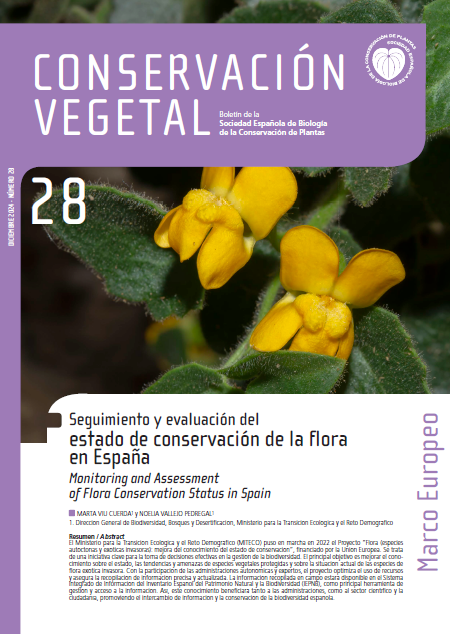Evaluación de viabilidad en semillas del género Sideritis tras diez años en banco de germoplasma
Mots-clés :
Germinación, conservación ex situ, Labiatae, semillas ortodoxas, a largo plazoRésumé
El presente estudio evalúa la viabilidad de diez especies del género Sideritis tras diez años de conservación ex situ en el Banco de Germoplasma Vegetal del Jardín Botánico de Castilla-La Mancha (BG-JBCLM). Se utilizaron dos métodos para determinar la viabilidad: la prueba de corte y el método de germinación (bajo condiciones controladas de 20/7°C y 12 horas luz/12 horas oscuridad). Los resultados muestran que cinco de las diez especies (S. lacaitae, S. lasiantha, S. fruticulosa, S. stachydioides y S. glacialis) presentaron valores de viabilidad entre un 5% y un 60% por debajo de lo observado en estudios previos con semillas frescas recién recolectadas. Esto podría atribuirse a factores ambientales o a diferencias en la tolerancia al proceso de conservación. Además, el método de germinación, en este caso, resultó insuficiente al no considerar las semillas viables latentes presentes en algunas especies, por lo que se destaca la necesidad de complementarlo con la prueba de turgencia para obtener una evaluación más precisa. Así, la información obtenida en este trabajo complementada con estudios sobre el efecto de los factores ambientales in situ, y del propio proceso de conservación, es fundamental para una óptima gestión de especies del género Sideritis en bancos de germoplasma.
Téléchargements
Références
• Baskin CC & JM Baskin (1998) Seeds: ecology, biogeography, and, evolution of dormancy and germination. Elsevier.
• Cochran, WG (1941). The distribution of the largest of a set of estimated variances as a fraction of their total. Annals of Eugenics, 11, 47–52.
• Copete MA, Herranz JM, Ferrandis P & E Copete (2015) Annual dormancy cycles in buried seeds of shrub species: germination ecology of Sideritis serrata (Labiatae). Plant Biology, 17(4), 798-807.
• David, HA (1952). Upper 5 and 1% points of the maximum F-ratio. Biometrika, 39(3/4), 422-424.
• Estrelles E, Güemes J, Riera J, Boscaiu M, Ibars AM & M Costa (2010) Seed germination behaviour in Sideritis from different Iberian habitats. Notulae Botanicae Horti Agrobotanici Cluj-Napoca, 38(1), 09-13.
• Gómez-Campo, C (2002) Long term seed preservation: the risk of using inadequate containers is very high. Monographs ETSIA, Universidad Politécnica de Madrid 163: 1-10.
• Morales R, Quintanar A & FJ Cabezas (2010). Labiatae (En) Morales, R., Quintanar A., Cabezas F.J.,Pujadas A.J., & Cirujano S. Flora Ibérica XII: Verbenaceae-Labiatae-Callitrichaceae.24-496. Real Jardín Botánico, CSIC.
• Penfield, S (2017) Seed dormancy and germination. Current Biology, 27(17), R874-R878.
• Penfield S & DR MacGregor (2017). Effects of environmental variation during seed production on seed dormancy and germination. Journal of experimental Botany, 68(4), 819-825.
• Pérez-García F, González-Benito ME & C Gómez-Campo (2008). Germination of fourteen endemic species from the Iberian Peninsula, Canary and Balearic Islands after 32-34 years of storage at low temperature and very low water content. Seed Science and Technology, 36(2), 407-422.
• Santiago A, Herranz JM & P Ferrandis (2013). El banco de germoplasma vegetal del Jardín Botánico de Castilla-La Mancha: implicaciones para la conservación” ex situ” de flora silvestre. Sabuco: Revista de estudios albacetenses, (9), 95-111.
• Solberg S Ø, Yndgaard F, Andreasen C, Von Bothmer R, Loskutov IG & Å Asdal (2020) Long-term storage and longevity of orthodox seeds: A systematic review. Frontiers in Plant Science, 11, 1007.
• Van Treuren R, de Groot EC & TJ van Hintum (2013) Preservation of seed viability during 25 years of storage under standard genebank conditions. Genetic Resources and Crop Evolution, 60(4), 1407-1421.

